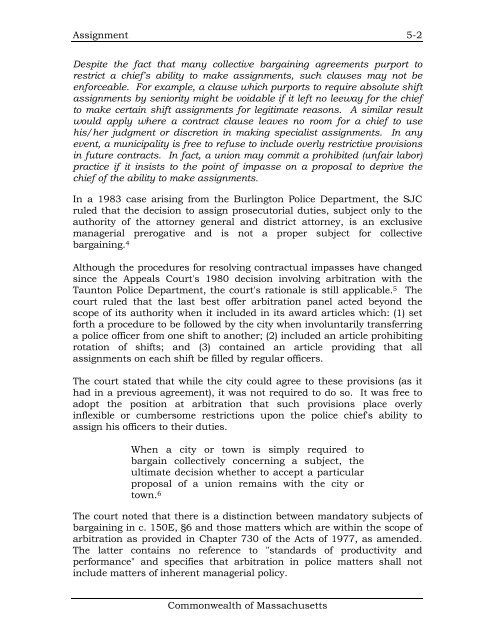Management Rights - AELE's Home Page
Management Rights - AELE's Home Page
Management Rights - AELE's Home Page
Create successful ePaper yourself
Turn your PDF publications into a flip-book with our unique Google optimized e-Paper software.
Assignment 5-2<br />
Despite the fact that many collective bargaining agreements purport to<br />
restrict a chief's ability to make assignments, such clauses may not be<br />
enforceable. For example, a clause which purports to require absolute shift<br />
assignments by seniority might be voidable if it left no leeway for the chief<br />
to make certain shift assignments for legitimate reasons. A similar result<br />
would apply where a contract clause leaves no room for a chief to use<br />
his/her judgment or discretion in making specialist assignments. In any<br />
event, a municipality is free to refuse to include overly restrictive provisions<br />
in future contracts. In fact, a union may commit a prohibited (unfair labor)<br />
practice if it insists to the point of impasse on a proposal to deprive the<br />
chief of the ability to make assignments.<br />
In a 1983 case arising from the Burlington Police Department, the SJC<br />
ruled that the decision to assign prosecutorial duties, subject only to the<br />
authority of the attorney general and district attorney, is an exclusive<br />
managerial prerogative and is not a proper subject for collective<br />
bargaining. 4<br />
Although the procedures for resolving contractual impasses have changed<br />
since the Appeals Court's 1980 decision involving arbitration with the<br />
Taunton Police Department, the court's rationale is still applicable. 5 The<br />
court ruled that the last best offer arbitration panel acted beyond the<br />
scope of its authority when it included in its award articles which: (1) set<br />
forth a procedure to be followed by the city when involuntarily transferring<br />
a police officer from one shift to another; (2) included an article prohibiting<br />
rotation of shifts; and (3) contained an article providing that all<br />
assignments on each shift be filled by regular officers.<br />
The court stated that while the city could agree to these provisions (as it<br />
had in a previous agreement), it was not required to do so. It was free to<br />
adopt the position at arbitration that such provisions place overly<br />
inflexible or cumbersome restrictions upon the police chief's ability to<br />
assign his officers to their duties.<br />
When a city or town is simply required to<br />
bargain collectively concerning a subject, the<br />
ultimate decision whether to accept a particular<br />
proposal of a union remains with the city or<br />
town. 6<br />
The court noted that there is a distinction between mandatory subjects of<br />
bargaining in c. 150E, §6 and those matters which are within the scope of<br />
arbitration as provided in Chapter 730 of the Acts of 1977, as amended.<br />
The latter contains no reference to "standards of productivity and<br />
performance" and specifies that arbitration in police matters shall not<br />
include matters of inherent managerial policy.<br />
Commonwealth of Massachusetts
















